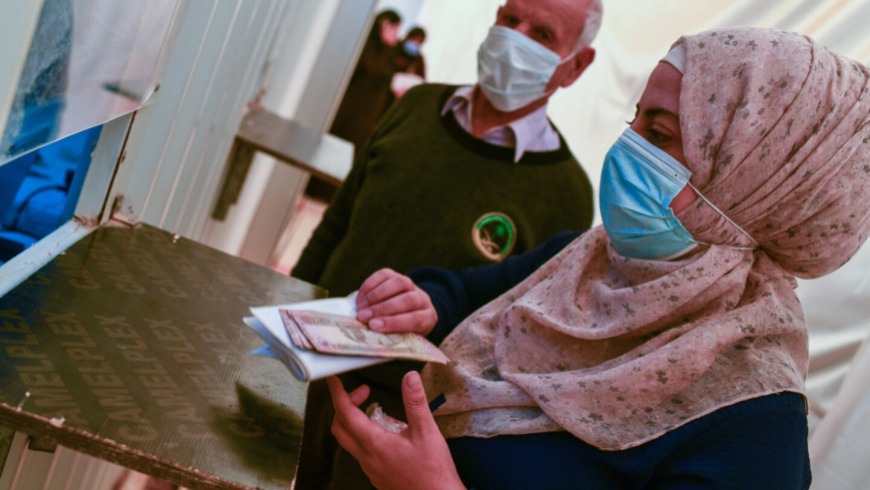Syrian individuals residing in Jordan are currently confronted with a fresh humanitarian challenge that looms over them. This predicament has arisen following the World Food Program’s difficult decision to discontinue its provision of food aid. This decision is a direct consequence of an unparalleled funding shortfall. Consequently, the World Food Program has undertaken a gradual reduction in aid for refugees residing outside the designated camps. This reduction has affected approximately half a million refugee beneficiaries, with a shift in focus towards extending assistance primarily to the most vulnerable families, starting this month. Unfortunately, around 50,000 refugees are slated to be entirely excluded from the monthly aid distribution.
Turning to the refugees residing within the camps, the World Food Program has also revealed a significant reduction in food assistance. Specifically, all 119,000 Syrian refugees housed within the Zaatari and Azraq camps will experience a reduction of one-third in their food aid allocation.
Unprecedented funding crisis
“I received a message informing me about the reduction in coupons,” shared Nassif Qatif, a Syrian refugee residing in Jordan. For Qatif and his family, including his wife and three children from Hama, this aid was their sole means of sustenance. Qatif, unable to work due to a foot injury, expressed, “Our world has drastically narrowed. With no breadwinner, UNHCR staff visited my home multiple times, aware of my foot injury and my incapacity to work. Despite this, the aid has been curtailed, citing the direst cases. Are there others more in need than us? Can there be a refugee without any need for even the slightest support?”
Atheeb al-Ali, another Syrian refugee in Jordan, conveyed to Syria TV, “All Syrians here rely on God and these coupons. We occasionally find work as day labourers, earning meagre dinars per hour, which are quickly absorbed by rent, expenses, and the harsh reality of life. How are we to cope? How do we proceed after this disheartening news?”
This assistance is crucial for bolstering Syrian refugees, particularly given the severity of the crisis and the exorbitant cost of living in Jordan. Without it, they will encounter significant challenges in securing adequate sustenance.
Khawla Asaad Mansour, yet another Syrian refugee in Jordan, finds herself in a similar predicament. Initially receiving 23 dinars per person, this amount has now dwindled to 15 dinars per person, totalling 90 dinars (equivalent to US$127).
Khawla carefully calculates her monthly expenses to navigate through the month safely. For instance, she requires 130 Jordanian dinars for monthly rent, 17 dinars for utilities, 100 dinars for groceries, and 50 dinars for her infants.
Her family’s allowance barely covers a third of these essential expenses, making it evident that the reduced coupons fail to meet their needs. While these coupons never fully covered her expenses, they did offer some support, Khawla emphasized.
Upon completing her calculations, Khawla confronts a harsh reality that doesn’t always align with her meticulous planning: the aid reduction, her husband’s inability to obtain a work permit, and discussions with fellow Syrian neighbours about potential repatriation to a country they miraculously escaped from. These factors weigh heavily on her mind.
Khawla reveals that debts have begun to accumulate, forcing her to turn to the Women’s Fund for a loan to alleviate her financial burden. Repaying the loan requires an additional 70 dinars per month, pushing her to take up house cleaning jobs.
Before the decision to cut food subsidies for some and terminate them for others, UNHCR released a report highlighting the debt struggles of Syrian refugees in Jordan. The report indicated that 62 percent of refugees currently rely on credit to purchase food, and 11 percent are compelled to sell off their productive assets.
The report, titled “Vulnerability Assessment Framework: Demographic Survey of Refugees in Host Communities,” revealed that 62 percent of individuals facing severe shelter vulnerability also confront heightened risks related to sanitation and hygiene, based on a survey of 6,427 refugee households within Jordan’s host communities.
Additionally, the report noted that 17 percent of individuals grappling with severe basic needs also experience significant health challenges, while 15 percent of those facing severe educational barriers also grapple with profound food insecurity.
This article was translated and edited by The Syrian Observer. The Syrian Observer has not verified the content of this story. Responsibility for the information and views set out in this article lies entirely with the author.


